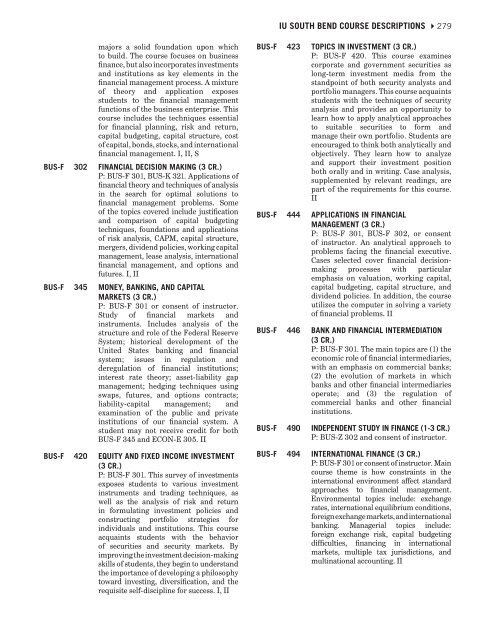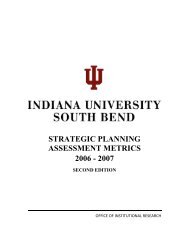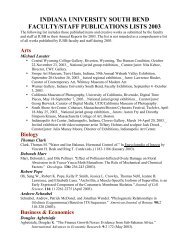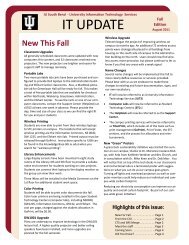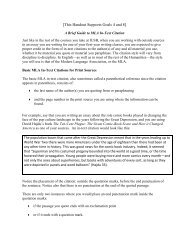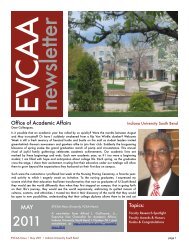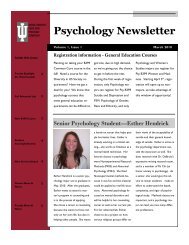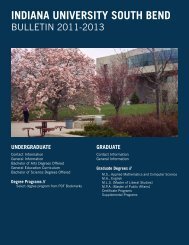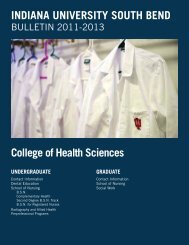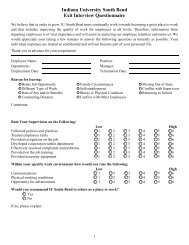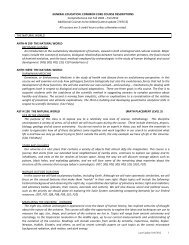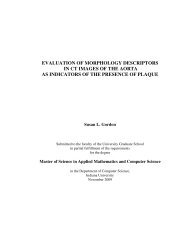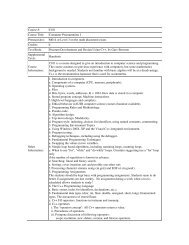INDIANA UNIVERSITY SOUTH BEND Course Descriptions
INDIANA UNIVERSITY SOUTH BEND Course Descriptions
INDIANA UNIVERSITY SOUTH BEND Course Descriptions
Create successful ePaper yourself
Turn your PDF publications into a flip-book with our unique Google optimized e-Paper software.
IU <strong>SOUTH</strong> <strong>BEND</strong> COURSE DESCRIPTIONS 4279<br />
majors a solid foundation upon which<br />
to build. The course focuses on business<br />
finance, but also incorporates investments<br />
and institutions as key elements in the<br />
financial management process. A mixture<br />
of theory and application exposes<br />
students to the financial management<br />
functions of the business enterprise. This<br />
course includes the techniques essential<br />
for financial planning, risk and return,<br />
capital budgeting, capital structure, cost<br />
of capital, bonds, stocks, and international<br />
financial management. I, II, S<br />
BUS-F 302 FINANCIAL DECISION MAKING (3 CR.)<br />
P: BUS-F 301, BUS-K 321. Applications of<br />
financial theory and techniques of analysis<br />
in the search for optimal solutions to<br />
financial management problems. Some<br />
of the topics covered include justification<br />
and comparison of capital budgeting<br />
techniques, foundations and applications<br />
of risk analysis, CAPM, capital structure,<br />
mergers, dividend policies, working capital<br />
management, lease analysis, international<br />
financial management, and options and<br />
futures. I, II<br />
BUS-F 345 MONEY, BANKING, AND CAPITAL<br />
MARKETS (3 CR.)<br />
P: BUS-F 301 or consent of instructor.<br />
Study of financial markets and<br />
instruments. Includes analysis of the<br />
structure and role of the Federal Reserve<br />
System; historical development of the<br />
United States banking and financial<br />
system; issues in regulation and<br />
deregulation of financial institutions;<br />
interest rate theory; asset-liability gap<br />
management; hedging techniques using<br />
swaps, futures, and options contracts;<br />
liability-capital management; and<br />
examination of the public and private<br />
institutions of our financial system. A<br />
student may not receive credit for both<br />
BUS-F 345 and ECON-E 305. II<br />
BUS-F 420 EQUITY AND FIXED INCOME INVESTMENT<br />
(3 CR.)<br />
P: BUS-F 301. This survey of investments<br />
exposes students to various investment<br />
instruments and trading techniques, as<br />
well as the analysis of risk and return<br />
in formulating investment policies and<br />
constructing portfolio strategies for<br />
individuals and institutions. This course<br />
acquaints students with the behavior<br />
of securities and security markets. By<br />
improving the investment decision-making<br />
skills of students, they begin to understand<br />
the importance of developing a philosophy<br />
toward investing, diversification, and the<br />
requisite self-discipline for success. I, II<br />
BUS-F 423 TOPICS IN INVESTMENT (3 CR.)<br />
P: BUS-F 420. This course examines<br />
corporate and government securities as<br />
long-term investment media from the<br />
standpoint of both security analysts and<br />
portfolio managers. This course acquaints<br />
students with the techniques of security<br />
analysis and provides an opportunity to<br />
learn how to apply analytical approaches<br />
to suitable securities to form and<br />
manage their own portfolio. Students are<br />
encouraged to think both analytically and<br />
objectively. They learn how to analyze<br />
and support their investment position<br />
both orally and in writing. Case analysis,<br />
supplemented by relevant readings, are<br />
part of the requirements for this course.<br />
II<br />
BUS-F 444 APPLICATIONS IN FINANCIAL<br />
MANAGEMENT (3 CR.)<br />
P: BUS-F 301, BUS-F 302, or consent<br />
of instructor. An analytical approach to<br />
problems facing the financial executive.<br />
Cases selected cover financial decisionmaking<br />
processes with particular<br />
emphasis on valuation, working capital,<br />
capital budgeting, capital structure, and<br />
dividend policies. In addition, the course<br />
utilizes the computer in solving a variety<br />
of financial problems. II<br />
BUS-F 446 BANK AND FINANCIAL INTERMEDIATION<br />
(3 CR.)<br />
P: BUS-F 301. The main topics are (1) the<br />
economic role of financial intermediaries,<br />
with an emphasis on commercial banks;<br />
(2) the evolution of markets in which<br />
banks and other financial intermediaries<br />
operate; and (3) the regulation of<br />
commercial banks and other financial<br />
institutions.<br />
BUS-F 490 INDEPENDENT STUDY IN FINANCE (1-3 CR.)<br />
P: BUS-Z 302 and consent of instructor.<br />
BUS-F 494 INTERNATIONAL FINANCE (3 CR.)<br />
P: BUS-F 301 or consent of instructor. Main<br />
course theme is how constraints in the<br />
international environment affect standard<br />
approaches to financial management.<br />
Environmental topics include: exchange<br />
rates, international equilibrium conditions,<br />
foreign exchange markets, and international<br />
banking. Managerial topics include:<br />
foreign exchange risk, capital budgeting<br />
difficulties, financing in international<br />
markets, multiple tax jurisdictions, and<br />
multinational accounting. II


